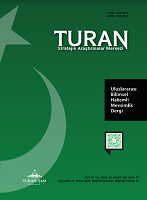RİND-ZAHİD ÇATIŞMASININ MOLLA TİPİNE YANSIMASI: TEZVÎRÎ’NİN MONLÂ REDİFLİ HİCVİYYELERİ
REFLECTION OF RIND-ZAHID CONFLICT ON MULLAH TYPE: TEZVÎRÎ'S HIJVIYYES WITH MONLÂ REDİF
Author(s): Bülent ŞIĞVA, Üyesi Salih ÖZYURTSubject(s): Sociology of Culture, Theory of Literature, Sociology of Art, History of Art, Sociology of Literature
Published by: Sage Yayınları
Keywords: Tezvîrî; Satire; Munlah (Monlâ);
Summary/Abstract: Divan poets, who created works in Sufi style, discussed the conflict of rind-zahid both in some of their independent works and in some of their poems that they wrote in verse forms such as odes and ghazels. The poets compared the type of zahid who put the mind to the fore and takes ostentatiousness as the axis, and the type of rind, who are considered as the connoisseur of the heart that isolates himself from the records of the transient world, thanks to his mystical bond stemming from malāmah (blame). While discussing the rind-zahid conflict, the Divan poets, who see themselves as rind, described the zahid type as vulgar and satirized it. In this article, firstly, a general information about the type of satire will be given and the appearance of the rindzahid conflict in Divan poetry will be discussed. Two satirical poems with "monlâ" redif, which are thought to be written by Tezvîrî, will be evaluated in terms of their features of form and content. It will be revealed in which ways Tezvîrî satirized the type of mullah and what kind of satirical styles he adopted. The article will be completed with the transcription of the poems into Latin letters.
Journal: TURAN-SAM
- Issue Year: 15/2023
- Issue No: 57
- Page Range: 90-99
- Page Count: 10
- Language: Turkish

